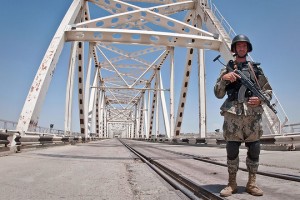Special to WorldTribune.com
By Brian M. Downing, FreePressers.com
Just a few months ago, U.S.-Pakistani relations were abysmal, perhaps even at a crisis point.
An American airstrike had killed 25 or more Pakistani soldiers and Pakistan retaliated by closing off U.S./ISAF supply lines into Afghanistan. Tensions increased and many worried of more border skirmishes along the Af-Pak border and even of an attack on the U.S. embassy. It would not have been the first; the U.S. embassy in Islamabad was seized and burned in 1979, not long after the Teheran embassy was seized.

Yet over the last few weeks, hostile rhetoric has declined and relations have improved. Pakistan had been making exorbitant demands for transit fees; traffic has reopened, puzzlingly without any transit fees at all.
U.S. drone attacks inside Pakistan have restarted with little of the outrage from politicians and generals. Only last Saturday, a key figure in the Haqqani Network was apparently killed in a drone strike in North Waziristan. The Haqqanis are favorites of the Pakistani military and are thought to be responsible for a number of assassinations, bombings, and urban attacks inside Afghanistan.
Drone strikes on the Haqqanis are likely the result of cooperation between the U.S. and Pakistan. What accounts for this remarkable and welcome turnaround regarding Pakistan’s support for insurgent and terrorist groups?
Pakistani generals have long believed that any loss of American support would be compensated by an increase in Chinese support. Indeed, the generals were confident that the U.S. was so fearful of this that it would treat carefully and respectfully with them. Over the last year, however, China has offered only verbal support. It pulled away from an offer to build a naval base in western Pakistan. Pakistan’s putative ace-in-the-hole chose not to be in the deal, perhaps sensing that Pakistan offered little military or commercial advantage.
Closing down the supply routes into Afghanistan was not the powerful weapon Pakistan once thought. The U.S. expanded the northern route through Russia and Russian-influenced countries such as Uzbekistan. It was far more costly to the U.S., but far more reliable.
Pakistan also miscalculated the importance of the supply routes for its economy. The generals had closed down the passes into Afghanistan but at the cost of idling port facilities, depots, and truckers. Perhaps most ominously, Pakistan saw the U.S. moving closer to India – Pakistan’s dreaded foe since Partition in 1947.
Pakistan faces long-term economic woes that threaten the country’s territorial integrity. Its economy has languished under the weight of inefficient military-dominated enterprises while its Indian rival has enjoyed impressive growth. Pakistan’s foreign debt has swollen and its ability to honor payment schedules is imperiled. An international aid effort of Athenian dimensions will be necessary and a frowning U.S. could weaken or block any such effort.
Other global pressures are clear. There is growing evidence that the Pakistani army, or at least its intelligence services, have close ties with a slew of terrorist groups, including the above-mentioned Haqqani Network and also Lashkar-i-Taiba, the group responsible for the 2008 Mumbai attack. Such ties threaten to make Pakistan even more an international pariah than it already is.
Last year’s U.S. special forces operation that found and killed Osama bin Laden within earshot of a Pakistani army base did little to weaken the perception of Pakistan as a sponsor of world terrorism. Pakistan had to act to avoid global sanctions, and it will have to continue to move away from its deadly client groups.
The U.S. has won a substantial diplomatic victory in detaching Pakistan from its policy of supporting insurgent and terrorist groups. The country, however, remains dominated by corrupt and inept elites, civilians and generals, who preside increasingly precariously over an immense impoverished population, fifty percent of which is under the age of twenty-two. The diplomatic victory may have come at the cost of solidifying ties with a failing state that will absorb more and more U.S. resources for decades to come.

You must be logged in to post a comment Login